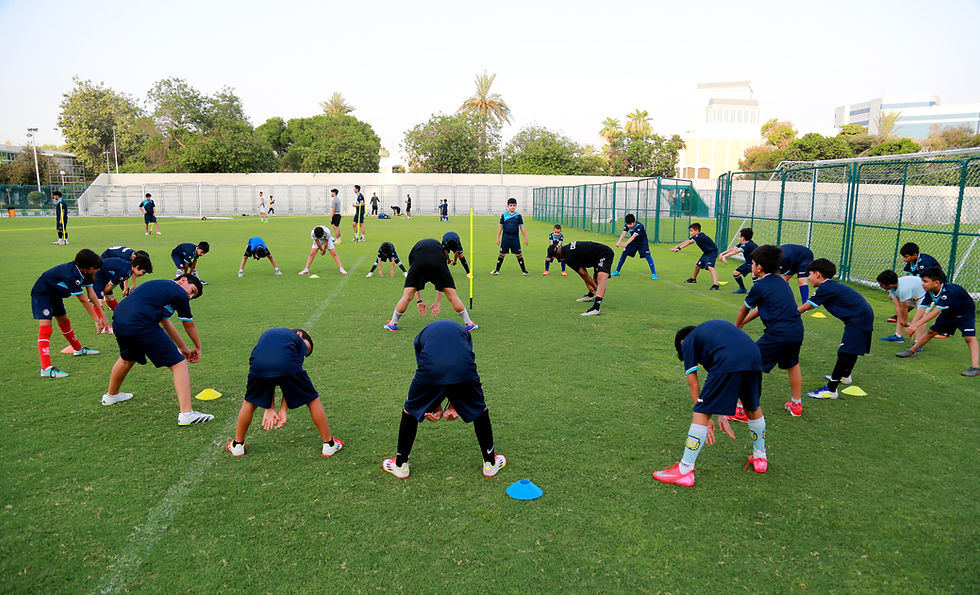How to Choose the Right Program Level for Your Child [Football Parents’ Guide]
- Mohammad Reza Shoaripour
- Jul 10, 2025
- 3 min read
Introduction: Why Getting It Right Matters
Picking the correct football program level for your child is more than just about skill. It impacts your child’s health, confidence, friendships, and overall love for the sport. Many parents feel uncertain, especially when comparing U10 vs U14 football or navigating a complex football class age guide.
This guide will help you understand how to choose the right football program, avoid common pitfalls, and feel assured that you’re setting your child up for long-term success.
Understanding Football Program Levels by Age
What Does U10 vs U14 Football Really Mean?
“U10” means “under 10”—for kids who are 9 or younger at the start of the season. Similarly, “U14” is for players under 14. This system:
Keeps physical competition fair
Aligns drills and tactics to age-level understanding
Protects younger kids from injury risks
Football Class Age Guide: Typical Group Breakdowns
While clubs vary, many academies follow this general structure:
Age Group | Common Label | Typical Focus |
3-5 yrs | Mini-Kickers | Motor skills, fun games |
6-8 yrs | U8 | Basics of dribbling, passing, friendly matches |
9-10 yrs | U10 | Technique, small-sided tactics |
11-13 yrs | U12-U13 | Positioning, teamwork under pressure |
14+ yrs | U14+ | Advanced tactics, fitness, competition prep |
Always verify your academy’s age programs for exact cut-offs.

Key Factors in Choosing the Right Football Program
Physical Development: Size & Coordination
Two kids the same age can be very different physically. Look for a program that adapts to body growth, ensuring drills don’t overload joints.
Cognitive Readiness: Can They Handle Tactics?
Some kids grasp spacing and formations at 9, others need till 12. Programs shouldn’t overload younger players with complex tactics.
Emotional Maturity: Ready for Wins & Losses?
A child who melts down over losing may benefit from another season in a fun-focused group before competitive levels.
Social Fit: Playing with Same-Age Peers
Being with peers boosts comfort. A shy 10-year-old in a group of towering 13-year-olds might feel out of place, even if technically skilled.
Signs You Might Be in the Wrong Level
Too Easy: Boredom or Lack of Challenge
Your child doesn’t focus
Complains drills are repetitive
Dominates easily without learning
Too Hard: Frustration or Anxiety
Reluctant to attend
Feels left out of team dynamics
Seems tense or upset after training
U10 vs U14 Football: What’s the Real Difference?
Intensity & Training Focus
U10 focuses on technique and enjoyment. By U14, intensity ramps up, with fitness circuits, formations, and mental prep.
Match Rules & Field Sizes
U10 often plays 7v7 on smaller fields.
U14 moves to 9v9 or 11v11, learning offside lines, zonal marking.
Coach Expectations & Player Autonomy
By U14, players are expected to self-manage hydration, warm-ups, and even peer feedback. Younger kids rely on constant prompts.
How Football Class Age Guides Keep Kids On Track
Preventing Injuries & Overuse
Training too advanced can strain growing bones. Proper levels ensure safe load—critical during growth spurts.
Matching Technical Work to Growth Phases
A good football class age guide avoids skipping fundamentals. It ensures step-by-step mastery—turns, shielding, then creative passing.
Practical Tips to Help Parents Choose
Talk to Coaches & Ask for Honest Assessments
Great academies offer feedback on your child’s best fit. They’ll even let kids try both current and next levels.
Book a Free Trial to See Fit in Action
Nothing beats seeing your child on the pitch. A no-risk free trial reveals if they’re challenged and happy.
Trust Your Child’s Enjoyment Level
At home, do they show off new moves or talk excitedly about practice? That’s the ultimate sign you’re in the right program.
FAQs on Choosing Football Program Levels
Can my child play up an age group if advanced?
Often, yes—if emotionally ready and physically safe. Coaches will assess.
Is it bad to repeat a level?
Not at all. Repeating builds confidence and cements skills.
What if my child wants to play just for fun?
Pick a program emphasizing enjoyment over competition. Many have social or recreation-only tracks.
How often should they train at each stage?
Under 12: 2-3x/week is ideal. Older teens might train 4-5x for competitive paths.
Where can I compare programs in Dubai?
Explore local age programs or ask for free assessments.
Conclusion: Confident Choices, Happy Players
Learning how to choose the right football program means respecting your child’s growth—physically, mentally, and socially. When kids play at the right level, they thrive, learn resilience, and build lifelong love for football. Trust the process, stay informed, and always prioritize joy.



